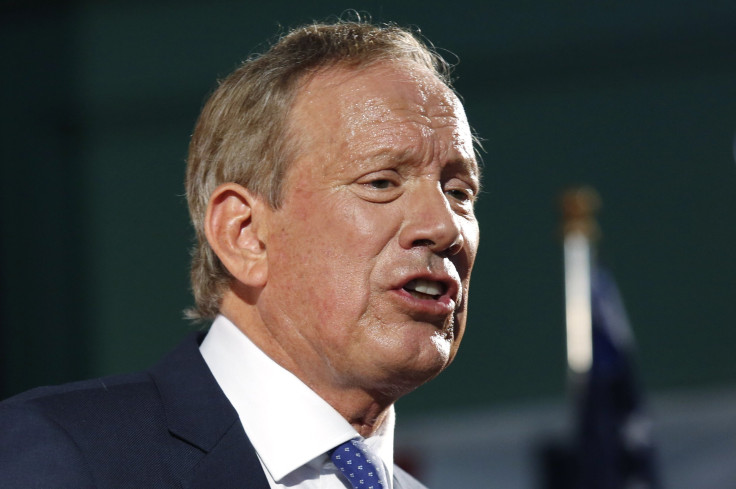
George E. Pataki is latest presidential candidate to enter the Republican primary with some pro-immigrant lines on his resume, but is under fire from immigration advocates for opposing President Obama’s executive actions on immigration. Like many of his middle-of-the-road Republican rivals Pataki isn’t arguing for “self-deportation” or amnesty with a pathway to citizenship. That’s way too Romney 2012. Unlike his opponents further on the right, the former NY Gov. says he’d support a way to incorporate the undocumented immigrants that are already in the U.S.
"I believe it's totally unrealistic if we think we're going to take 11 million people and send them back where they came from," he said at an Iowa forum, according to the AP. "We do have to find a way for the vast majority of them to legalize their status here."
In 2002 Pataki even helped pass and later signed a law that allowed undocumented immigrants to pay in-state tuition in New York State universities. The bill was most helpful for Dreamers -- undocumented immigrants who weren’t born in the U.S. but grew up there, graduating from American schools. One of the Dreamers who benefitted from Pataki’s bill is Cristina Jimenez, now managing director for United We Dream (UWD), a pro-immigrant organization.
“It was the immigrant community and allies from our state that mobilized and organized and because of those efforts I was able to get a bachelor’s and master's degrees from CUNY - and thousands of New Yorkers have been able to pursue their dream of an education,” Jimenez said in a statement released by UWD.
Yet Pataki isn’t close to winning the support of Dreamers like Jimenez. if elected, Pataki has promised to undo Obama’s executive actions on immigration. The most far-reaching part of the program, DAPA, gives millions of parents of Dreamers temporary deportation relief as well as permission to work legally. DACA, another element of the White House’s plan, give Dreamers the same benefits. It also opens them up for state-level benefits that were denied to them in the past, such as in-state tuition and driver’s licenses. Arizona, home to an infamously anti-immigrant state government, has had to offer both of these services to thousands of undocumented as a result of DACA. Pataki disagrees with the President, saying that he surpassed his executive authority.
“It’s not a question of what you want to do. It’s what you can do,” Pataki said on the Fusion show American, hosted by Jorge Ramos. “I think we do have to have an approach that provides the ability for those here illegally to legalize their status when they’ve obeyed the law, contributed to America. [...] But I don’t think the way the president did it was right.”
Simply refusing to deport undocumented residents isn’t enough for immigration activists, who want to consolidate the hard-fought victories they won during Obama’s two terms in office. Emboldened by a recent pledge by presidential-hopeful Hillary Clinton promising to continue DACA and DAPA and fight for a “path for full and equal citizenship”, Jimenez and her colleagues are trying raising the benchmark for what it means to be pro-immigrant, win the Latino vote and, ultimately, be a competitive nominee.
“Any realistic candidate for president must support existing deportation relief programs as well as immigration reform that addresses the moral crisis in our community and provides a full and equal path to citizenship, or be at risk of alienating the largest growing electorate in the country,” Jimenez said. “By opposing deferred action programs that already protect nearly 700,000 Dreamers and are set to protect millions more, Pataki is turning his back on his own immigration record by advocating for the deportation of my parents.”
President Obama was the target of massive protests in 2012 from immigration advocates who felt he’s let immigration reform slip too far down his list of priorities. In 2013, Congress failed to forge a bipartisan grand bargain and pass a comprehensive immigration reform bill that would address both border security and human rights concerns. In late 2014, Barack Obama announced executive immigration actions that would bring around 5 million immigrants out of the shadows through DACA and DAPA. Those actions, which would have taken effect earlier this month, are currently under injunction by a district judge pending the outcome of a massive lawsuit spearheaded by Republican-leaning states.
© 2025 Latin Times. All rights reserved. Do not reproduce without permission.




